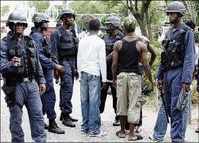Tight lips cripple crime-fight effort
Published: Sunday | October 4, 2009

File
Policemen talking with residents in downtown Kingston. There is an entrenched culture of silence in Jamaica where citizens are reluctant and afraid to share what they know with law-enforcement officers. This culture is one of the factors hampering the success of the police and apprehending crimminals.
Athaliah Reynolds, Staff Reporter
THIS old and popular Bible verse written by King Solomon seems to have immense credence for many Jamaicans who have adopted a culture of silence:
"He that keepeth his mouth keepeth his life: but he that openeth wide his lips shall have destruction." Proverbs 13:3 (KJV)
Although it has been widely stated that the 'tight lips' of Jamaicans is crippling the crime-fighting efforts of the police, it seems there is no end in sight to this custom.
A rap session with a group of young people between 16 and 24 years old at a youth centre in Spanish Town recently revealed that the 'informer fi dead' phenomenon is deeply entrenched in the psyche of many of the country's youth, almost like a secret pact or vow that is taken from childhood.
However, while some admitted that they would want justice for their loved ones and would be willing to share information with the police, they pointed to a deep distrust for the law enforcers as a deterrent to telling what they know.
The students also said that the lack of trust in most authority figures, including those in the justice system, was the reason there were so many reprisal killings, as most Jamaicans believed this was the best way to get "real justice".
The young people, who reside in communities across the war-torn 'Old Capital', revealed that from as far back as they could remember, they were told that to 'rat out' a fellow community member or worse, the area don, was a crime punishable by death.
"It's just something weh yuh grow come hear and yuh see the results too, so you nuh haffi wonder what will happen to yuh if yuh talk," Crystal Daley, a 23-year-old student told The Sunday Gleaner.
'I will never talk'
Daley said she witnessed her uncle being shot and tortured a few years ago and said up to this day, she has not gone to the police to give any information.
"I will never, ever talk," she vowed. "One funeral better than 10. Most of my family live in the same community, plus, I have two young children. I not going to put them at risk like that."
Daley added: "It's better one member of yuh family go, than yuh entire family get wipe out. Me know people inna my same area weh give evidence or go to the police and mek statement, and before dem reach home, dem house burn down, and if dem dare fi come back inna the community, dem a dead!" she declared.
Interestingly, Daley's father and partner are both members of the Jamaica Constabulary Force, but she is still adamant that she would never share information with law enforcers.
According to Daley, she knows that the police are not to be trusted and so, even if she wanted to give a statement, she fears that the police would betray her trust.
"Police corrupt. Me know that for a fact, 'cause my father plant ganja and sell weed fi the area don," she said.
Twenty-year-old Orlando Powellechoed Daley's sentiments. He said a mistrust for the police by most residents served as fuel for the culture of silence.
"If most people inna di ghetto did know seh dem coulda trust the police, dem woulda risk it and talk, but that a nuh di reality," he argued.
"Most time when a man go to the police wid a report, di same police call back di don inna di area and tell him a who talk," Powell added.
He said to be branded as an informer in most Jamaican communities is sometimes worse than being called a criminal.
"When a man rob or kill, depending on the situation, most people will look at it and seh him a defend a turf, or is a survival thing. But when the community see yuh as a snitch or informa, a di worse ting dat fi happen to yuh; is like yuh a not even a man again," he said.
Nineteen-year-old Jameson Lawrencesaid ratting on a community member was not something a real man would do. "A real man nah walk inna no police station and sit down and give statement," he said. "A sissy do dem tings dere. Real man a nuh snitch," he added.
Lawrence, who was quickly backed up by many of the students, said in most cases, the culture of silence and a lack of trust in the country's justice system were connected to the high levels of reprisal killings.
"If somebody do something to my brother or mother and I don't like it, I going go back and hurt that person, because yuh can't talk to the police," he said. "A just so it set up, a so it work."
Names changed to protect persons' identity.
athaliah.reynolds@gleanerjm.com









